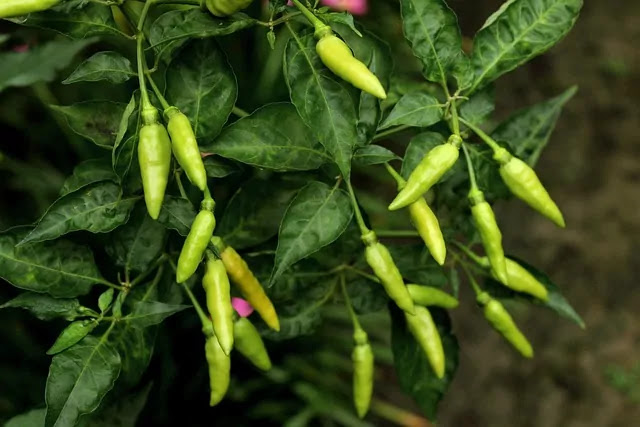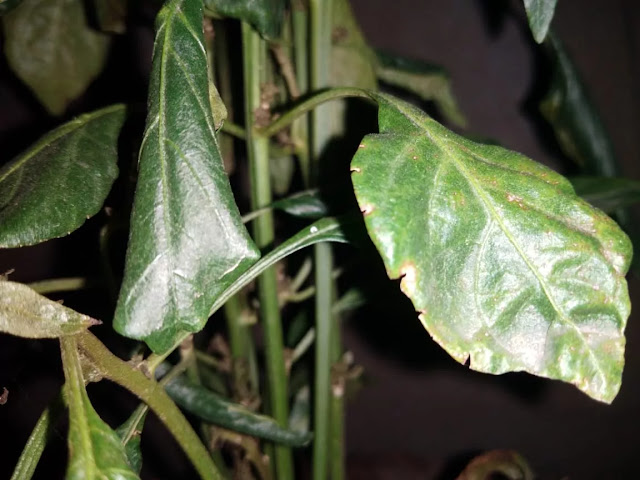मिर्च is the fruit plant from the genus Capsicum and is cultivated worldwide for spiciness of the fruit. In India nearly all the cooked vegetables have chilli in them as a flavouring agent.
The substance or the chemical that gives spicy flavor in chilli or adds hotness in the taste is Capsaicin and few other chemicals called capsaicinoids. The hottest pepper or chilli of India is Bhut Jolokia i.e. also known as Ghost Pepper.
This fruit vegetable that adds heat to dishes originated in Mexico and gradually spread across the world. China produces nearly 50% of the world’s total chilli production. The total production in the year 2016 was 34.5 million tonnes of green chilli and 3.9 million tonnes of dried chilli.
India is the leading in the production of dried chilli, it produces 36% of the total dried chilli production of the world. There are total five species of chilli that are domesticated and these five species have many varieties that are being cultivated.
Farmers can earn huge benefits by cultivating this vegetable plant in their farm, this plant is also loved by garden enthusiast. Gardeners are interested to grow different varieties of chilli in their alluring garden.
But to grow this plant successfully in large farms or home gardens, you need to be aware about major diseases that can affect your plant. Many farmers and gardeners have reported problem of leaf curl virus attack in their plants.
In this article I will tell you “how to control leaf curl virus in chilli?“
Leaf curl virus attack on peppers is one of the reason for reduced crop yields and in severe cases loss of total crop. This demotivates farmers and gardeners very much. But you do not need to get disappointed because you are an active member and reader of एग्रीकल्चर रिव्यू.
I will discuss symptoms, control and preventive measures that you should follow to save your plants from leaf curl virus.
और पढ़ें: HOW TO GROW BELL PEPPERS
Table of Contents
Symptoms of Leaf curl virus disease in Chilli
- The first and the most important symptom is deformation and curling of leaves towards midrib.
- Flower growth become disrupted without having pollen grains in them therefore reduces overall fruit yield.
- Plant growth get stunted due to shortened internodes and reduction in leaf size due to curling.
- The vector of this disease is whitefly. They are responsible for transmitting this viral disease in your plants.
The control measures of virus diseases in chilli are not yet defined hence we try to adopt cultural and mechanical method to control this plant. I always believe that prevention is better than cure. That’s why I suggest to adopt preventive measures seriously to save your plants from this disease.
Preventive Measures to Control Leaf Curl Virus
- Always select healthy, resistant and disease free seeds from the market. You can check the quality of the variety or cultivar on the internet. Purchase only if it shows resistant quality to this disease. Do not purchase open and untreated seeds.
- Avoid monoculture of chilli crop in large farms i.e. do not grow single crop of chilli only. Adopt intercultural practices in the field.
- Before sowing the seeds, soak it in solution having 150 grams Trisodium orthriphosphate in one litre of water for 30 minutes. It will inhibit seed borne inoculum. Wash seeds treated with this solution with water properly before sowing.
- Cover your nursery beds with nylon net or straw to prevent seeds from viral infection.
- If you are growing this crop in large farms then you should grow maize or sorghum as border crops to prevent spread of aphid vectors that can spread disease in your farm.
- Keep spraying insecticides timely, general prescription is once in a month to control aphid vectors. If you want to control organically then you can try spraying neem oil mix to prevent your plant from this disease. Spray neem oil mix weekly in late evenings.
Control Measures For Leaf Curl Virus Disease
- Remove the infected plant completely and burn them or bury them in a distant place.
- You can apply Carbofuran 3G @ 4 to 5 Kg per acre in agriculture farms. In home gardens try to control vectors by spraying neem oil mix or another organic substitute that I have already mentioned in the article on “Aphids Control.”







